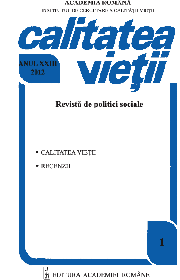Percepția inegalităților economice
Perception of economic inequalities
Author(s): Mihai DumitruSubject(s): Social Sciences
Published by: Editura Academiei Române
Keywords: economic inequalities; wellbeing; poverty; material deprivation; social cohesion
Summary/Abstract: Economic inequalities are universal and inescapable. Social research revealed the atypical nature of income disparities and the long-term trend towards social polarization in Romania. For a country such as Romania – poor, in comparison with other European countries – research of living standards and the reduction of economic inequalities remain major challenges for the future. Relative poverty shows a worrying steadiness and income inequality is higher than in other European Union member states. How do people experience economic inequality? What are the effects of economic inequality on the quality of life and social cohesion? How does it show in division between the have and have-nots, the rich and the poor? A person’s chances for a better life depend both on individual traits (options and motivations, financial resources, social and professional skills, adequate representations of the rules governing social life) and the social structure, the opportunities and facilities offered by the social environment, the norms and practices of access to the world of consumption of goods and services. Economic inequalities seem very important for Romanians; the chances for a better living standard depend on the rules of the social interaction, to the degree these are fair or not. Nine out of ten Romanians regard inequality as too high; most of them think there are few opportunities to get a job and have a full life. In the long run, economic inequalities could contribute to economic growth and general prosperity. However, in the short run, rising inequality means more poverty. Almost two million Romanians live in poverty, being deprived of the fundamental needs; another 14% face the risk of poverty. The poor are part of the unemployed or occasionally employed. Material deprivation is more widespread in rural than in urban areas. The variance of material wellbeing influences – directly or indirectly – the quality of life (health, deprivations, life satisfaction), social interaction, and – at macro-social level – social cohesion. The rich and the poor inhabit different social worlds. The ones with a favourable view of the rich have an unfavourable view of the poor. In the opposite direction, positive evaluations of the poor are associated with criticism of the rich. The largest social distance is between “the new middle class” from the metropolis and those living in villages. Economic inequality and poverty have an effect on the social relations between social groups, leading to alienation and tensions. Romania tends to (re)turn into a status society.
Journal: Calitatea vieţii
- Issue Year: XXV/2014
- Issue No: 2
- Page Range: 111-123
- Page Count: 13
- Language: Romanian

